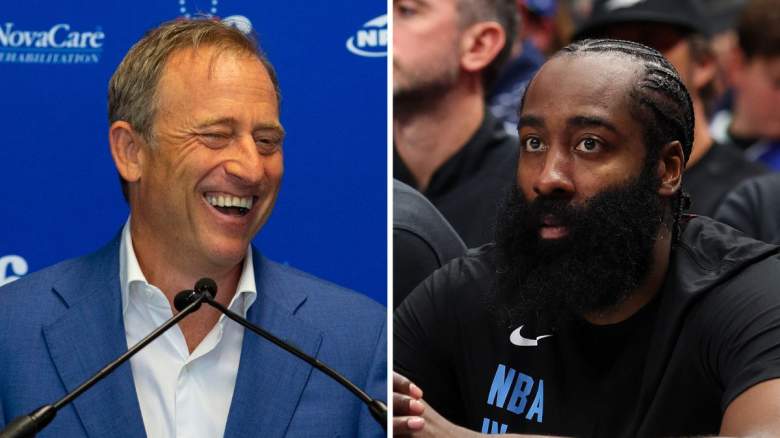
Getty NBA owner Josh Harris of the Sixers (left) and latest player empowerment symbol James Harden.
We no doubt haven’t seen the last of public trade demands by NBA players, particularly after people like Kevin Durant, Damian Lillard and James Harden (x3) essentially got their wishes granted.
But several sources say NBA owners are seeking ways to prevent, or at least, minimize the practice, particularly after Harden achieved the triple crown of get-me-out-of-town.
“I think the whole player empowerment piece that has been running in the league for last couple of years? I think it’s about run its course, because so many just haven’t worked out,” one Eastern source with experience at multiple levels in the league told Heavy Sports. “The poster child for that failure and the way in which guys force their ways to different teams at premium prices, you know, the James Harden effect, I do believe that owners are talking to each other and they’ve had enough.
“I KNOW they’re talking to each other, and it’s at the point where some of them have been burnt by this stuff and most of the rest of them have been played in some form or another. They’ve either been bidding for guys in trades or spent time looking at that stuff when they should have just been paying attention to their own business. And it just looks so bad for the league. The optics are awful.
“Everyone’s talking about Draymond (Green) putting (Rudy) Gobert in a headlock, but guys like Harden have been putting their teams and the league in a headlock for a few years now. It just looks bad to fans who are out there saying, ‘Who’s in charge here?'”
Celtics Paul Pierce on Player Empowerment
Hall of Famer Paul Pierce discussed the matter with Heavy Sports, understanding the situation now while defending his own flirtation with the process. He’d already been a five-time All-Star when the Celtic fortunes were slipping to below-.500 status in the early- to mid-aughts. Pierce was exploring the possibility of being elsewhere.
“But I never publicly did it,” he told Heavy. “And I didn’t say I wanted out. We talked about what’s next and what’s the future, like, what’s the game plan? Because if we’re not looking to build into a championship contender right now, then we need to look into a rebuild and you probably want to get me out of here. It was a crossroads.”
The Celtics proceeded to take the highway to the franchise’s 18th NBA title, dealing for Ray Allen and then Kevin Garnett in the summer of 2007.
The moves were a large and popular topic among sports fans — even in the league’s offseason. And therein lies the double-edged sword. The NBA loves when it’s front and center in the public conscious, but players looking for a divorce can appear a bit unseemly — and angering to the jilted fan base that’s been following them.
“I’m not so sure how good it is for the game,” Pierce said. “But at the same time, players have learned that they control their own destiny for the most part. It just seems like they’re taking more empowerment. But when you can get traded on a moment’s notice without no say-so and just get sent packing after establishing yourself in a community, I mean, what can you say?”
NBA Owners ‘A Tad Fed Up’
The NBA does have labor peace (the latest CBA runs through the 2029-30 season), but that doesn’t mean there isn’t room for some grumbling.
“I think some of the owners are getting a tad fed up with the idea that they are paying astronomical sums — and they wouldn’t pay it if they didn’t have it; I mean, the collective bargaining formula works — and then they get held up like this,” said a league source.
“If your best player or one of your best players says he wants out, how does that look when you’re trying to market your team to your public, when you’re trying to sell tickets and get people to watch your local TV games? Owners are like, hey, the only people bound by contracts now are us. Players don’t feel any sense of obligation by contract.”
That is, of course, an oversimplification that applies to some. But when some of those some are among their teams’ most marketable players, it can create an uneasy situation — both financially and in terms of perception, which can, in turn, impact the former.